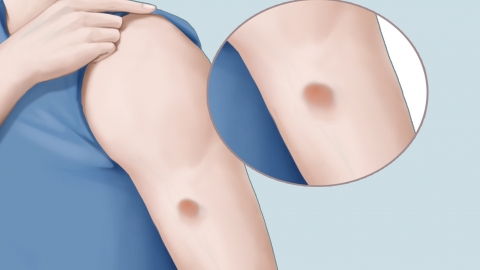Why does it hurt after being bitten by a mosquito?
Generally, pain after a mosquito bite may be caused by factors such as mosquito saliva irritation, local inflammatory reaction, skin sensitivity, secondary infection, or insect bite dermatitis. It is recommended to seek medical attention promptly, identify the underlying cause, and receive appropriate treatment under a doctor's guidance. The specific analysis is as follows:

1. Mosquito saliva irritation: When a mosquito bites, it injects saliva containing anticoagulant substances and proteins. This can irritate the skin's nerve endings, causing pain accompanied by mild itching and a small red spot at the bite site. Scratching should be avoided; instead, wash the affected area with soap and water to neutralize the acidic substances in the saliva and reduce irritation. Cold compresses can be used to relieve pain if it is significant.
2. Local inflammatory reaction: The mosquito's saliva can trigger an immune response in the body, causing local vasodilation and white blood cell aggregation, which leads to inflammation that stimulates surrounding tissues and nerves, resulting in pain. This is accompanied by redness, swelling, and warmth at the bite site, which typically becomes noticeable within a few hours. After being bitten, avoid rubbing the affected area. Apply calamine lotion to reduce inflammation, or gently press on the area to alleviate pain. Symptoms usually resolve spontaneously within 1–2 days.
3. Skin sensitivity: Individuals with sensitive skin may have a stronger reaction to components in mosquito saliva, resulting in more severe inflammation, significant pain, extensive redness and swelling, hard nodules at the bite site, and prolonged symptoms. Take preventive measures such as using mosquito nets and insect repellents to avoid bites. After being bitten, follow medical advice to use medications such as levocetirizine dihydrochloride tablets, loratadine syrup, or ebastine tablets to reduce allergic reactions and relieve pain and swelling.
4. Secondary infection: Scratching after a mosquito bite can break the skin, allowing bacteria to enter and cause infection. This exacerbates inflammation, intensifies pain, and may result in pus discharge, crusting at the bite site, and warmth and tenderness in the surrounding skin. Avoid scratching the affected area and maintain local cleanliness. Follow medical advice to apply topical antibiotics such as mupirocin ointment, fusidic acid cream, or erythromycin ointment. In severe cases of infection, oral antibiotics may be necessary.
5. Insect bite dermatitis: This is an acute inflammatory reaction triggered by a mosquito bite, characterized by hives and papules on the skin. Inflammation stimulates the nerves, causing pain along with intense itching, skin swelling, and coalescence of rashes into patches. Patients should avoid washing the affected area with hot water. Follow medical advice to use anti-inflammatory and antipruritic medications such as desonide cream, mometasone furoate cream, or hydrocortisone butyrate cream to relieve itching and pain. Additionally, avoid environments with high mosquito activity to prevent further bites.
When going outdoors, wear long sleeves and trousers, and apply insect repellent to exposed skin to reduce the likelihood of mosquito bites. Do not scratch bites; gently tapping the affected area can help relieve itching and prevent skin damage and subsequent infection. Maintain a clean living environment, regularly remove standing water, and reduce mosquito breeding sites to lower the risk of bites at the source.





